Knowing where to look for the right fibroid doctor can be challenging and even a little overwhelming. After all, many women in your position admit they know little about fibroids—at least initially. This includes telltale symptoms, how fibroids can impact their quality of life, and available treatment options. They hope to be educated, listened to, and even consoled emotionally by their primary provider, and some are. But statistics also show that most women aren’t diagnosed by their gynecologist right away. Even when they are, 73% who heard of non-surgical treatment such as uterine fibroid embolization (UFE) didn’t hear about it from their gynecologist first.
This lack of knowledge about fibroids, patient education, and guidance on their next steps, is a disservice to women everywhere—especially when you consider 3 out of 4 women will develop fibroids during their lifetime. The inability to ask the right questions or advocate for themselves adds to the challenge of finding treatment. Therefore, selecting the right fibroid doctor for your unique situation is crucial.
Living Your Best Life Fibroid Free Is Possible
Not every woman will have painful uterine fibroids in her lifetime. But if you’re one of the many whose life has been interrupted, finding relief and one day being fibroid free might seem impossible. Fibroids are non-cancerous tumors that develop from the muscle tissue of the uterus. They may be very painful for many women, mostly because they can develop in different locations, differ in size, and either stay that way or grow at different rates. Some women even delay getting diagnosed or seeking treatment because they think what they’re experiencing is normal as part of a woman’s monthly cycle. As a result, they can go years leading a limited life.
Some women are unaware they have fibroids and will only accidentally discover them during a routine pelvic or pregnancy exam with their doctor. In other situations, patients may experience fibroid pain and other life-altering symptoms, especially as they grow and put more pressure on the uterus and bladder.
Do any of these fibroid symptoms sound familiar?
- Painful periods, including heavy or inconsistent cycles
- Debilitating cramps, pelvic pain, and pressure
- Back or leg pain
- Bloating or swelling in the lower abdomen
- Weight gain
- Pain during sexual intercourse
- Urinary frequency
- Constipation, diarrhea, and rectum discomfort
These symptoms are not normal. Furthermore, this is not something that comes with being a woman. Additionally, surgical procedures such as a hysterectomy or myomectomy aren’t always your only options—regardless of what you may have heard or how you are being steered. An experienced and knowledgeable fibroid doctor won’t waste any time assessing your situation and educating you on your options.
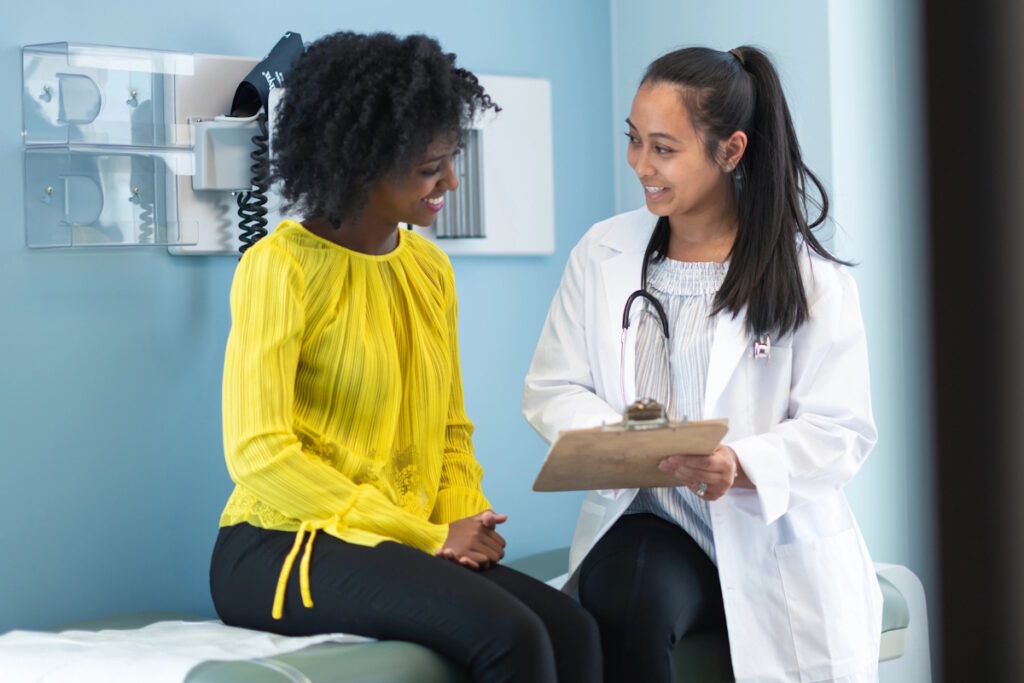
Find the Right Fibroid Doctor for You: 6 Tips
1. Advocate for yourself
A uterine fibroid research study conducted by experts from the Mayo Clinic, the Cleveland Clinic, and the University of North Carolina found that women delayed seeking treatment for an average of 3.6 years, with nearly a third waiting more than five years. Most of this was due to fear and lack of knowledge about treatment options.
If this sounds all too familiar for you, having a gynecologist or fibroid doctor in your corner—someone who is open to back-and-forth dialogue, answering every question or concern, setting expectations along the way, and honoring your wishes—is one significant way to help feel more in control and have less fear of treatment.
Here is a list of questions to ask if you have fibroid symptoms and how to advocate for yourself positively.
- What are uterine fibroids, and are they cancerous?
- Do I need to have them treated? What happens if I delay treatment?
- What are my options, and can I avoid surgery?
- Can I prevent fibroids?
- If I do nothing, will my fibroids keep me from getting pregnant?
- What can I expect before, during, and after fibroid treatment?
- What is the long-term outlook for me after a nonsurgical procedure like UFE?
- Will I have access to my fibroid doctor after the procedure?
2. Ask for a referral
Women are used to seeing a gynecologist regularly for annual exams, pap smears, pregnancy-related care, and even for questions and care related to painful uterine fibroids. But when those symptoms become ongoing and/or life-interrupting, it’s common to refer patients to an interventional radiologist like Dr. John Fischer or Dr. Suzanne Slonim at Fibroid Institute Texas.
While you may be surprised to see your gynecologist refer you to a fibroid doctor, this is a good thing in terms of continuity of care while also having all treatment options available. It’s so you can make a more informed decision about what is in your best interest.
3. Research the practice
Fibroid doctors are not difficult to find—even if your gynecologist doesn’t work with anyone in particular. Start by narrowing your search to providers in your immediate area, then expand your search from there. Once you have a solid list of potential doctors, take the time to research each practice individually online, in person, and by phone.
As you do, consider these questions:
- How long has the practice been in business?
- How fibroid focused are they? Do they only specialize in fibroids?
- Do they offer non-surgical options?
- How many procedures have they performed?
- Is their facility warm and inviting?
- What is the doctor’s specific approach to each procedure?
- Are procedures performed in an outpatient setting? Or is hospitalization required?
- Was the staff competent and friendly when you called or visited?
- Do they accept your insurance? Do they manage insurance pre-authorizations?
- Do they take care of ordering MRIs and diagnostic scans?
- Does the practice provide direct doctor accessibility?
- Did they answer all your questions?
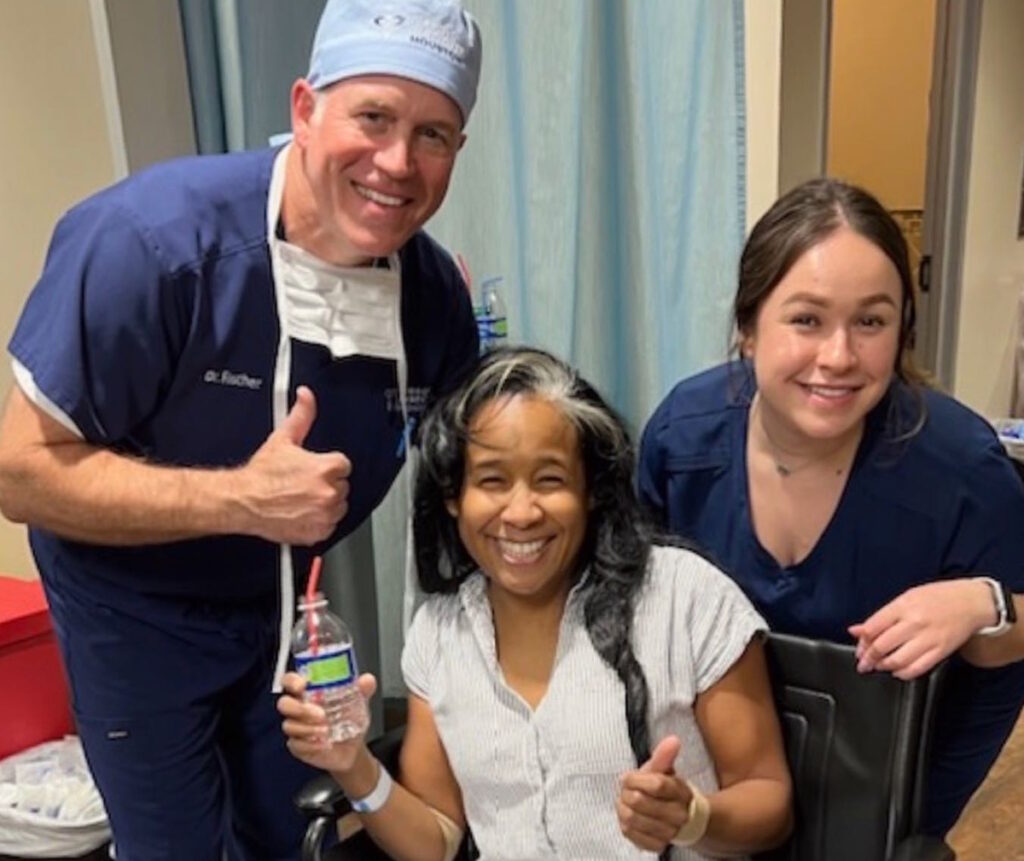
4. Read online patient testimonials and stories
If you know someone (a parent, family member, friend, etc.) who has had fibroids, ask them who they chose as their fibroid doctor and if they had a good experience. Get as much information as possible, as their first-hand knowledge can be crucial to ensuring you feel comfortable with your choice. If you don’t know anyone personally, online, or in-person support groups for women with fibroids can be valuable sources.
Hearing from other women who had fibroid treatment may help alleviate any concerns. For example at Fibroid Institute, our practice has made it a point over the years to provide in-depth patient stories on our website, where potential patients can get more intimate details from real patients who put their trust in Fibroid Institute as their fibroid doctor. We provide a place for patient video interviews, reviews, and testimonials.
5. Look for media coverage
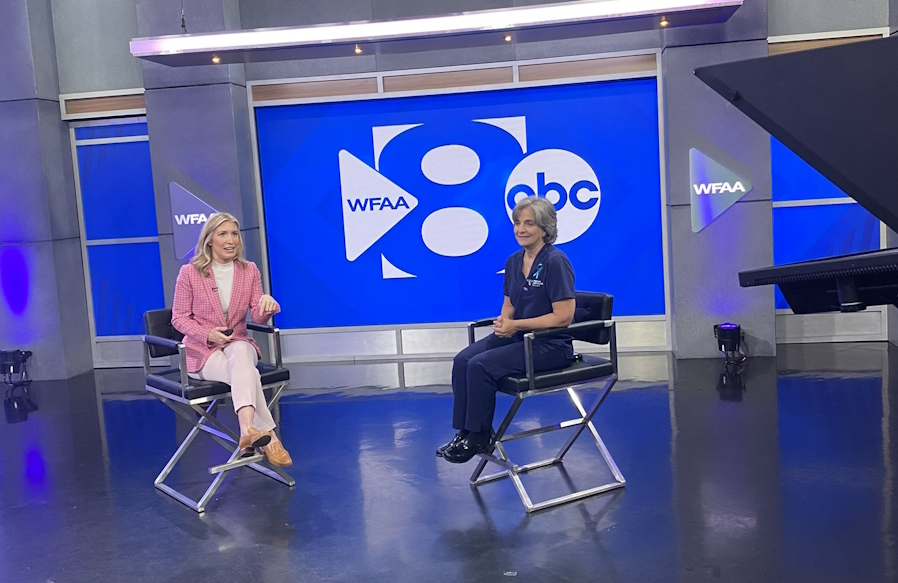
While there are certainly “hidden gems” out there in the medical community, some of the most respected and well-known fibroid doctors are ones relied on as sources in fibroid-related content such as magazine articles, podcasts, press conferences, television interviews, etc. They could also be in the news for a recent award or to promote key legislation in spreading fibroid awareness efforts. For example, Dr. Slonim has been named as one of D Magazine’s Best Doctors.
Not only does media coverage and industry achievements help you seek out the right fibroid doctor faster, but it gives you quick access to important credentials that will help narrow down your search. Our fibroid doctors are board-certified interventional radiologists and experts who are passionate about helping women become fibroid free. Dr. Slonim and Dr. Fischer have been instrumental in spearheading Uterine Fibroid Awareness Month in Texas and are highly experienced UFE specialists—100% focused on fibroid issues.
6. Look for options in care
The good news when it comes to uterine fibroid treatment is that women today have plenty of options. It’s not like the old days when doctors only recommended a hysterectomy. That’s not to suggest that a hysterectomy isn’t the best option for you. But many alternatives exist, including those that don’t require surgery. Some women may not be good candidates for surgery, or they may wish to avoid surgery.
UFE is a unique, non-invasive procedure. Rather than remove fibroids, our physicians perform UFE using X-ray guidance to locate the vessels that supply blood to your fibroids. They inject small particles into the vessels through a tiny catheter to non-invasively cut off blood supply to the fibroids. This causes fibroids to shrink and die, fostering a dramatic reduction in symptoms for many women. With UFE, there’s no hospital stay and zero scarring. Additionally, the recovery time is much faster than surgery.
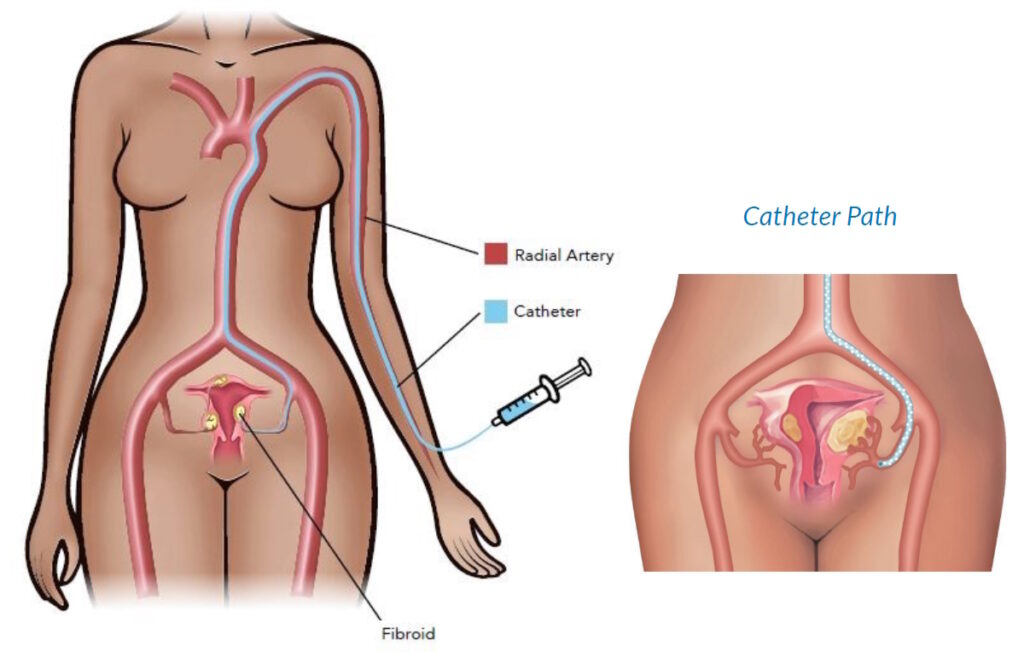
Get Screened By a Fibroid Doctor Today
It is important for women to be screened for uterine fibroids, especially if they have a history of fibroids in their family, if they notice anything different about their periods, or if they’re currently experiencing any of the symptoms mentioned above. If you do receive a confirmed diagnosis, remember that you have options.
Uterine fibroid embolization (UFE) is a unique procedure because of its ability to treat uterine fibroid symptoms—regardless of where they are located—without having to go through painful surgery and lengthy recovery time. Additional advantages of having your UFE procedure at Fibroid Institute Texas include the following:
- Covered by most major medical insurance
- Referrals are not required
- No hospital stay
- Tiny wrist puncture, no need for vaginal access
- Treat multiple fibroids at once
- 24/7 access to physicians during treatment
- Patients get direct access to their doctor’s mobile number
- Over 90% effective in reducing symptoms
- All providers are fibroid experts and UFE specialists
Although new technology and procedures may create excitement and potential, it is crucial to proceed with caution. Determining the long-term safety and success of a new procedure requires time. Fortunately, UFE (uterine fibroid embolization) has been practiced for over two decades, and numerous studies confirm its ongoing effectiveness and safety. Thousands of women have undergone UFE to treat their fibroids, resulting in lasting improvements.
Choose Fibroid Institute Texas. Because Experience Matters.
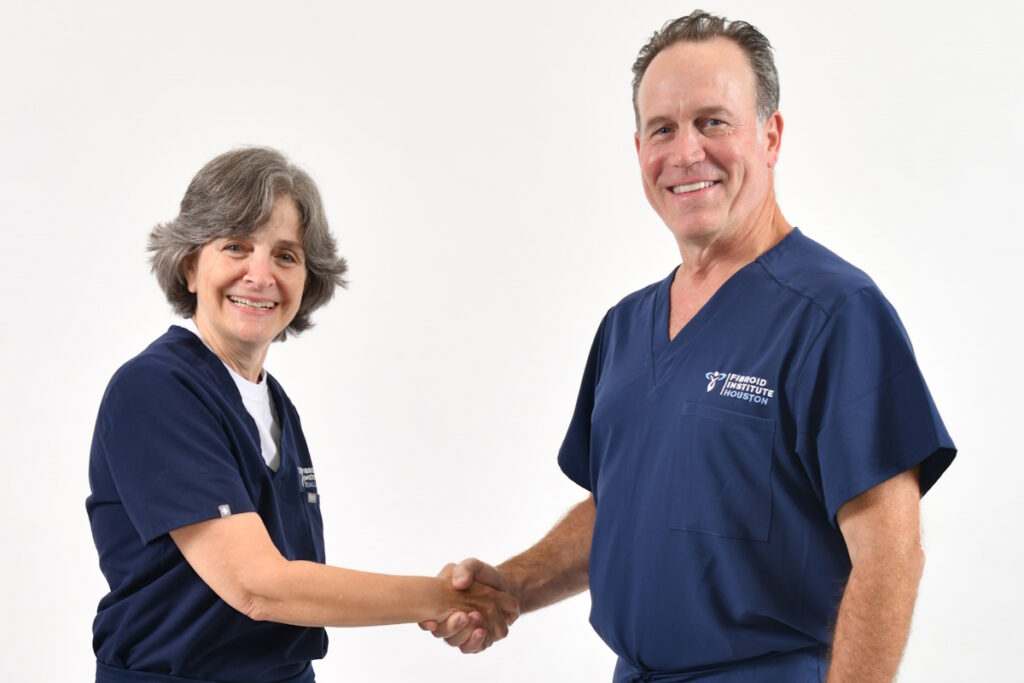
No woman should live with painful uterine fibroids. Sadly, many suffer in silence or do not receive a proper diagnosis fast enough to avoid many of the telltale symptoms that can make daily life uncomfortable. If you’re concerned about developing uterine fibroids in your lifetime, as well as potential treatment options, it is important to have an open conversation with a fibroid doctor. And if you are worried about finding the right fibroid doctor for you, we hope the tips above will ease those concerns.
Many times, women find after talking to a fibroid doctor that they don’t need to have surgery at all and that more non-surgical options are present. At Fibroid Institute, we are dedicated to educating and empowering women on fibroid treatment options. Furthermore, we handle all orders for MRIs and diagnostic scans. We also manage insurance pre-authorizations. Patients appreciate that treatments are scheduled in the comfort of our offices equipped with advanced medical technology.
With multiple locations, our Houston and Dallas fibroid centers help thousands of women avoid fibroid surgery but find relief from their fibroid symptoms. Our fibroid doctors are board-certified interventional radiologists and experts who are passionate about helping women become #FibroidFree. Dr. Suzanne Slonim, Dr. John Fischer, and Dr. Danny Chan are highly experienced UFE specialists at a medical practice that is 100% focused on fibroid issues.
We are dedicated to helping you become #FibroidFree. Get started now with Fibroid Institute Dallas at 214-838-6440 or with Fibroid Institute Houston at 713-903-3733 or complete the form below.
Fibroid Institute Texas serves the Dallas and Houston areas including Highland Park, University Park, Park Cities, Garland, Mesquite, Richardson, Dallas, Sherman, Houston, Sugar Land, Katy, Webster, Clear Lake, The Woodlands, Universal City, Spring, Kingwood, Stafford, Conroe, Texas City, Cypress, League City, Bellaire, Addison, Carrollton, Plano, Frisco, McKinney, Allen, Fort Worth, Grand Prairie, HEB, Arlington, Hutchins, Irving, Duncanville, DeSoto, Cedar Hill, Lancaster, Cockrell Hill, and more.
Prior to starting any new treatment or if you have questions regarding a medical condition, always seek the advice of your doctor or other qualified health provider. This information is not a substitute for professional medical advice.
*Patient stories are true. Names and/or photos may be changed to protect patient confidentiality.

